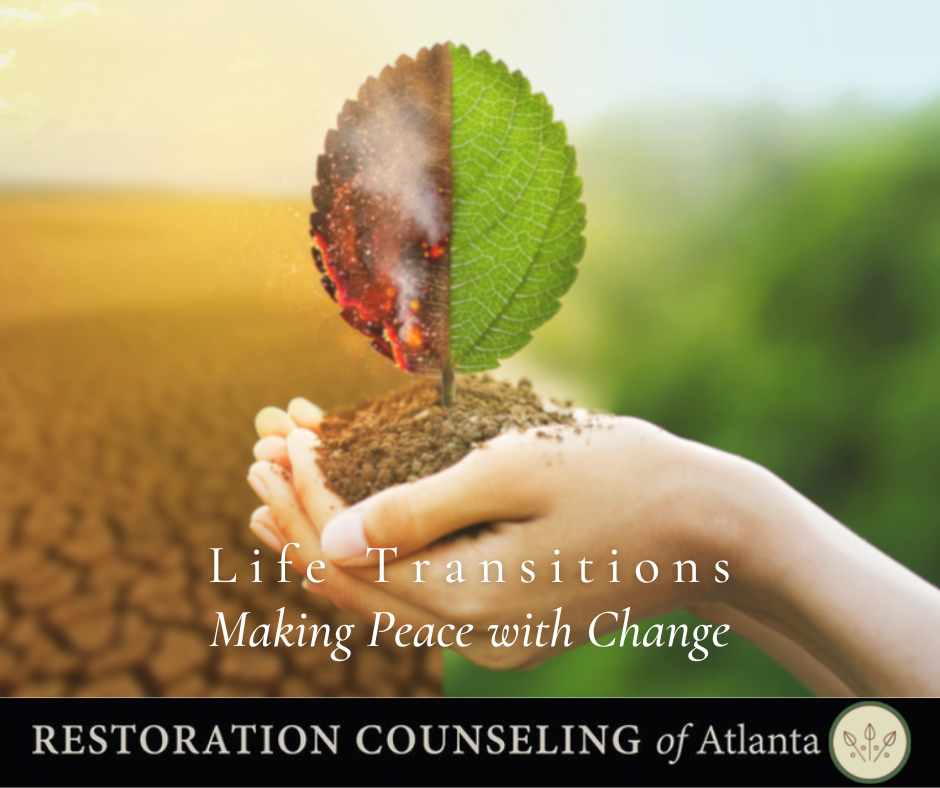Making Peace with Change
Ecclesiastes 3:1 says, “there is a time for everything and a season for every activity under the heavens” (New International Version Bible, 2011). Human beings experience minor and major life changes and transitions that can be positive, negative, or somewhere in between. The Oxford English dictionary defines transition as “the process or a period of changing from one state or condition to another.”
There are micro transitions throughout our day as we switch from one meeting to another. We encounter macro transitions when entering kindergarten, puberty, graduating, moving, marrying, or changing career paths. These changes can be felt immediately, like a child’s temper tantrum, or over time, like the slow progression of depression after retirement.
Change, as most of us are aware, is as predictable a human experience as birth, death, or taxes. What we need to be made aware of is the way positive and negative, micro and macro changes impact our brains and well-being. How we manage these transitions can determine how resilient we are in the face of change.
Why Human Beings React to Change
Our complex brains are designed to transition and change from birth, allowing us the ability to develop higher-order thinking and processing. What allows our brains to problem solve, innovate, communicate, and have empathy also causes our brains to take longer to develop, and to struggle when we encounter something new.
The human brain takes in so much information at any given moment, we must rely on neurological shortcuts that help us perform routine tasks and quickly assess whether something is dangerous. As a result, we rely on habit, routine, and repeated behavior which allows our brains to perform optimally. However, when we encounter change such as leaving the playground, leaving for college, or switching careers, this triggers a threat in our brains. Even if we are excited about the change, physiologically our bodies react. This is also because change results in new neural connections, which uses up energy! For example, compare yourself as a beginner driver to how you drive currently – your brain had to accommodate that transition as you became a safer and more experienced driver!
How we handle transitions can alter the trajectory of the change. We manage change more successfully when we adjust our awareness, preparation, and mindset in ways that allow enhanced accommodation of change.
Awareness of Change
Elevating awareness regarding the way humans are impacted by transition and change can directly impact the way the change is experienced.
In Children:
Understanding child development and the ages and stages of child behavior can directly increase your ability to predict when a change is coming. Parents can help their child experience change more successfully by building in transition periods during the day or week. Even teenagers thrive on a predictable schedule, time to rest, and a “heads up” before switching from one activity to another. Too many transitions in a day can lead to meltdowns at ALL ages.
In Adults:
A lack of transition periods throughout the day may impact adults who are battling stress and anxiety. We use transitions for school-aged children, but adults also need them to regulate stress and emotions, and provide the mental clarity needed for enhanced productivity. The next time you are transitioning between meetings, give yourself 2-5 minutes to stand, take a couple of deep breaths, and think about the goals of the next meeting. This quick, but purposeful pause will make that meeting more effective.
The unknown of what comes next is both exciting and scary to our brains, as change alters the way we function. Even positive changes can alter performance. A welcome retirement or job change can lead to a struggle to regain a sense of purpose and identity. Sending a child to kindergarten or off to college can trigger a sense of pride, but also loss. Life transitions can trigger reactions to past loss. For example, getting married can trigger sadness regarding the loss of a parent in childhood.
If you are struggling following a transition, it can be helpful to explore with a counselor how this new phase can be triggering loss from a previous phase of life.
Preparation for Change
Short-term preparation can mean building up your coping skills or adding transition times during the day to help shift from one activity to the next. For example, when your teenager gets home from school, allow them 30-60 mins of alone time before they begin another activity. For adults, create a way to decompress on the drive home from work so you can be present with your family.
We do not always have the luxury to predict a transition, but when we do, we can prepare. If you know your child is graduating and leaving home, think about the way that will impact you, your spouse, and the family. Where will that change be positive? Where could you or a loved one be triggered? Build in ways to help buffer that change now and lean into enhancing your coping skills before the change. Lastly, prepare for the impact of change to be immediate, but long-term. Frequently, there is excitement following a change. As that excitement lessens, you may experience feelings of loss over “the way things used to be.”
Mindset
Seasons of transition provide a time to explore what you would like from life. We know that our brains view change as a threat, but because of our thinking or executive parts of our brain, we can speak into that response. There are numerous therapeutic techniques that counselors use to help shift your perception of the change. For example, your therapists can work to help you focus on what you can control versus what you cannot control, or explore new opportunities to develop more purpose and meaning following a transition.
It does not matter if you are struggling with micro shifts during your day or experiencing a life-altering event, the therapists at Restoration Counseling of Atlanta would love to partner with you to help you manage transitions and change effectively!
 Written by Lauren Hamrick, MS, EdS, LPC, RPT, CPCS
Written by Lauren Hamrick, MS, EdS, LPC, RPT, CPCS
lauren@restorationcounselingatl.com
Roswell Location
Lauren is an active, educationally focused therapist who enjoys using both evidence-based and out-of-the-box approaches with children and adults. Lauren is also a registered play therapist. She listens to the interests, knowledge, and experience of her clients and incorporates them into her therapeutic approaches. Areas of focus include career-related stress, anxiety, PTSD, young adult issues, life transitions, abuse recovery, parenting, and family therapy. Lauren also enjoys working with couples who are dealing with parenting issues or are empty nesters.

